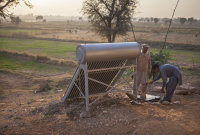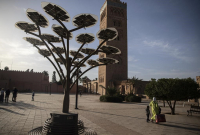Support strong Canadian climate journalism for 2025
For many around the globe, the protection of land, forests and water is a matter of life. And death.
Almost 2,000 land and environmental defenders were killed between 2012 and 2022 for protecting the planet, says NGO Global Witness, the vast majority in Latin America, where just last year, 156 people were murdered in the defence of the environment. One-third of these environmental defenders were Indigenous and of African descent. Many were women.
When the Acuerdo Escazú agreement was announced in 2018, it was heralded as a mechanism that would compel countries to stem the tide of violence across the continent. The agreement, signed by 25 countries and ratified by 15 countries in Latin America, guaranteed the right of all to access information, public participation and justice in environmental matters — and required governments to prevent and investigate attacks against environmental defenders. Yet, violence has persisted.
“There are a lot of interests behind the occupation of Indigenous lands,” said Leydy Pech, a Mayan beekeeper and land defender in Mexico who in 2020 received the Goldman Environmental Prize, the Nobel Prize of ecological activism. “We cannot say: The agreement is now in place and now all of our problems are solved. We have to work to ensure it is turned into reality.”
While regional and global agreements and policies are helping build a more sustainable world, local changemakers are shaping and materializing these ambitions.
As part of Canada’s international efforts on the climate emergency, the International Development Research Centre supports the Peruvian research institution Derecho, Ambiente y Recursos Naturales to examine state efforts to fight climate change and combat illicit economies, while documenting effective strategies leveraged by the Aymara, Asháninka, Kichwa and Kamentsá Biyá and other Indigenous environmental organizations to protect their rights and land in Brazil, Colombia and Peru.
With these findings, Indigenous communities will increase their capacity to protect themselves from threats, forge new Indigenous traditional knowledge and engage public officials to build a policy roadmap toward greater civic space for Indigenous leadership in climate action.
In development and humanitarian jargon, the process of increasing investment and respect for the role of local actors with the goal of improving their lives is called “localization.” More than a buzzword, localization is an outlook on the world that aims to shift power dynamics, amplify the voices of a variety of actors from the Global South and prevent the perpetuation of inequality.
Localization makes explicit the idea of equitable partnership between the Global South and the Global North. It calls on us to work with those least responsible for our changing climate and those made most vulnerable to the climate emergency.
This approach demands we strengthen the ecosystem of knowledge production by collaborating, mentoring, training and integrating community voices in research-to-policy processes. It means branching out beyond traditional researchers at academic institutions and universities to engage front-line changemakers. It also means funding research and action without dictating the terms of how those solutions are innovated and implemented.
In the face of the climate emergency, the benefits of research localization are far-reaching, strengthening community resilience and adaptation in ways that reinforce equity, and filling knowledge gaps that reduce persistent inequalities, including gender inequalities.
Indigenous rights defenders and their allies will join many other environmental leaders at Adaptation Futures, an international conference in Montreal this week, to share knowledge and solutions. In doing so, they are helping to integrate their rights and land defence strategies into knowledge that will protect and power emerging generations of environmental defenders around the world.
Whether it is Indigenous environmental defenders in Brazil, Colombia and Peru, Fulani women empowered to increase just and equitable climate resilience in the drylands of northern Nigeria, or women waste recyclers mobilized to build urban climate resilience in Nepal, there is immense wisdom, insight and will in local communities around the globe, proving that climate justice is as local as it is global.
And that global efforts mean nothing without locally grounded solutions and leadership.
Julie Delahanty is the president of the International Development Research Centre (IDRC), which shifts research into impact for a more sustainable and inclusive world.






Comments